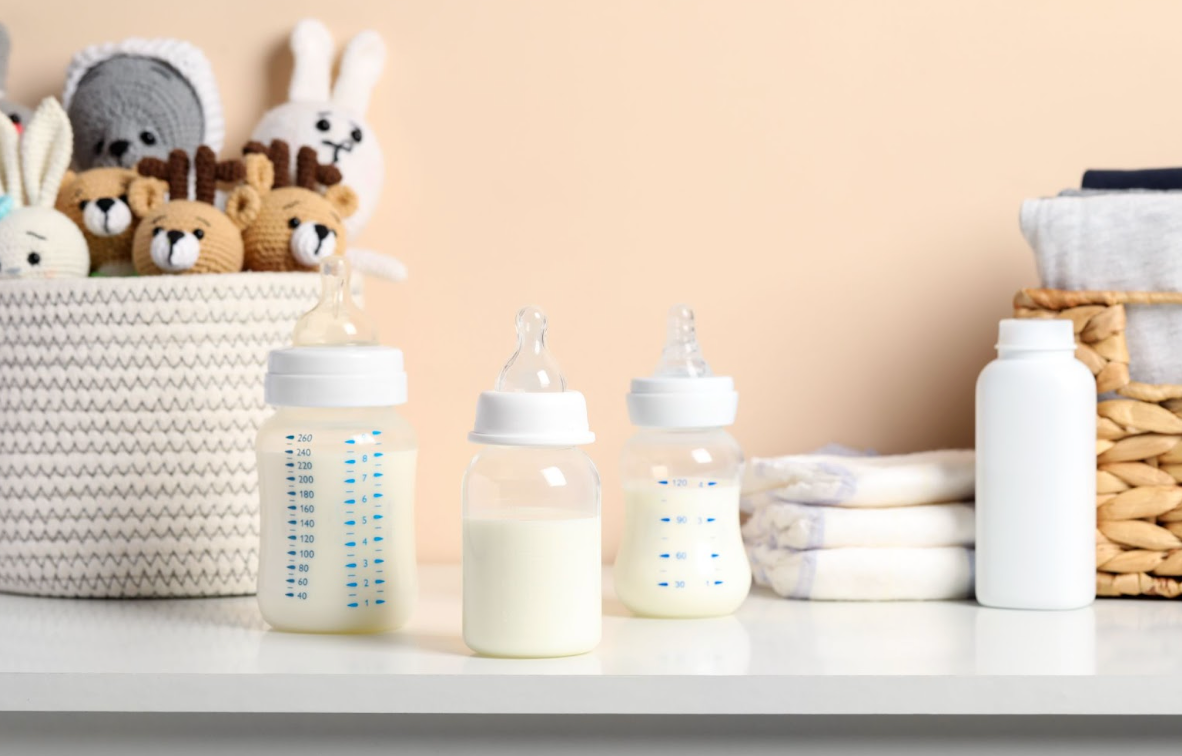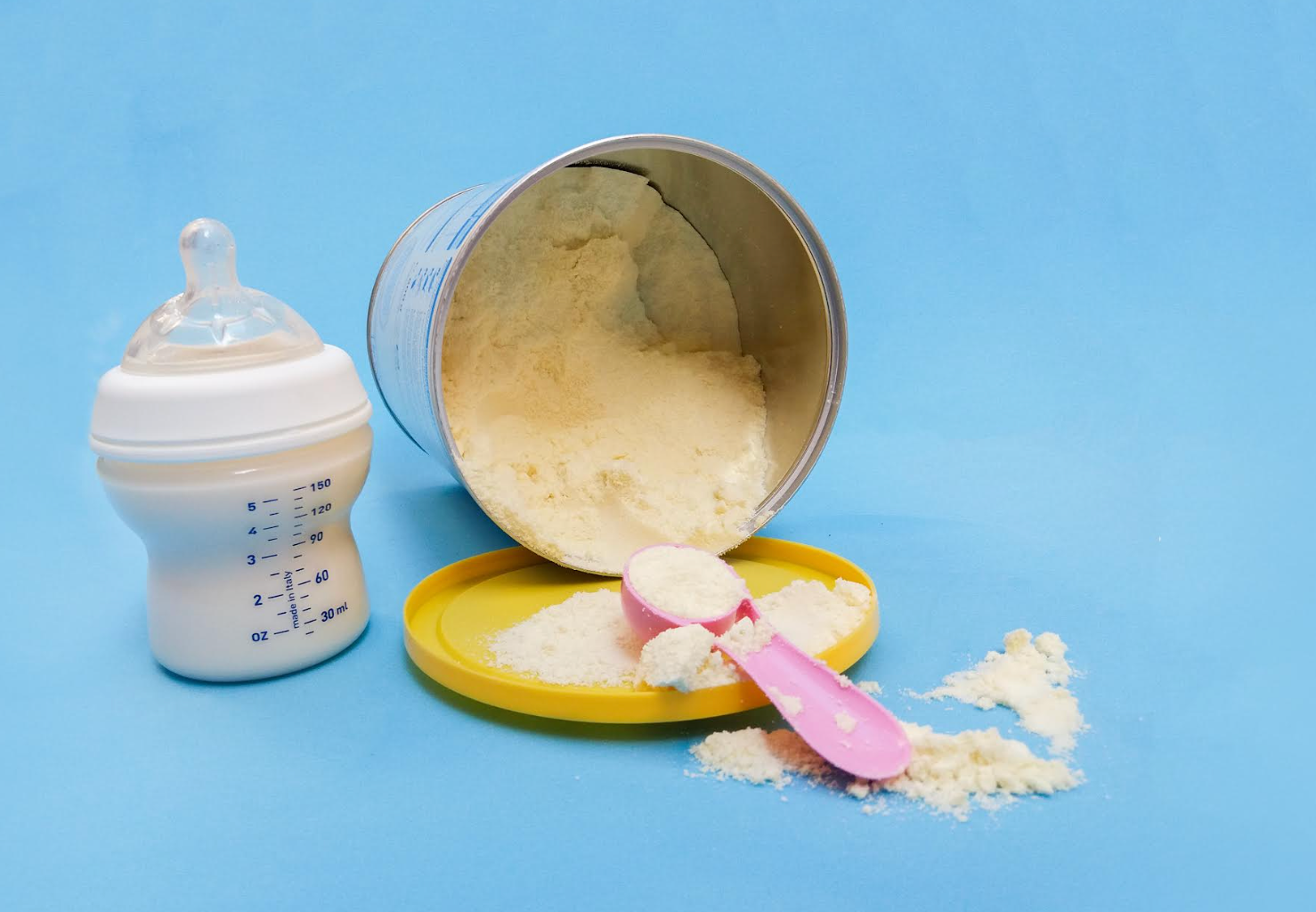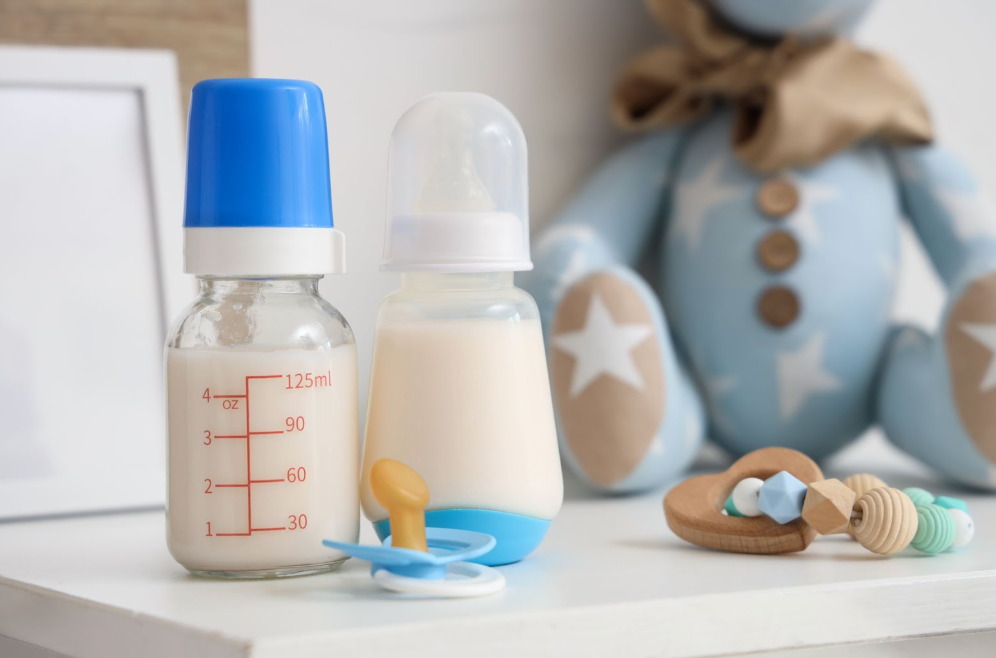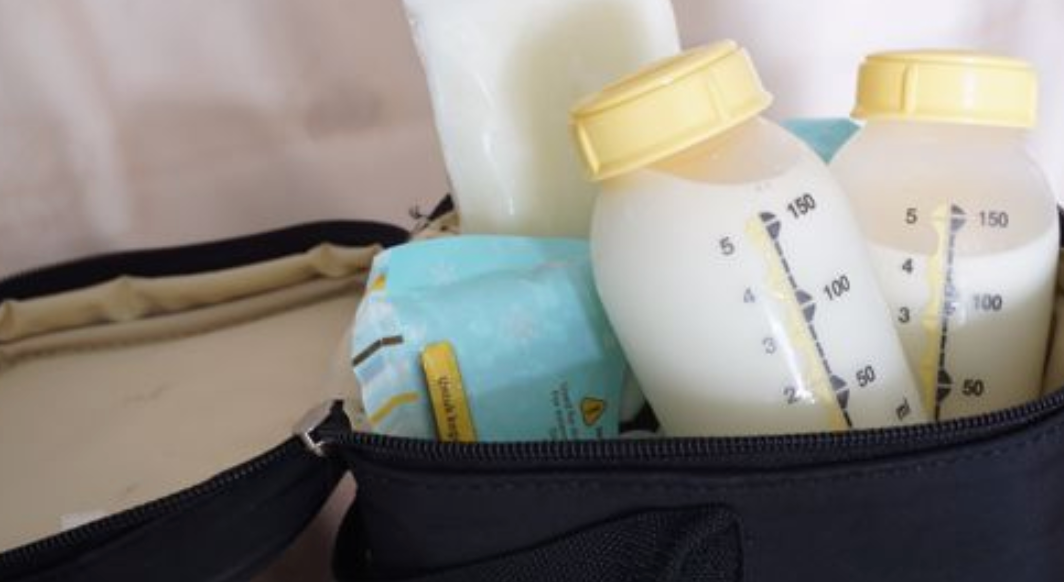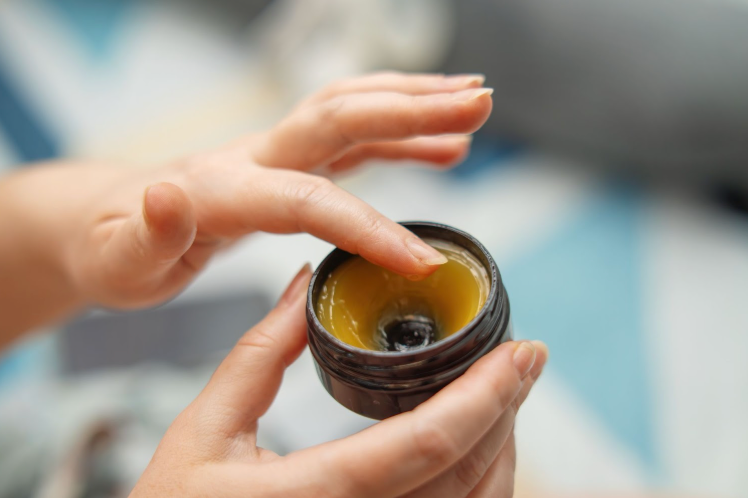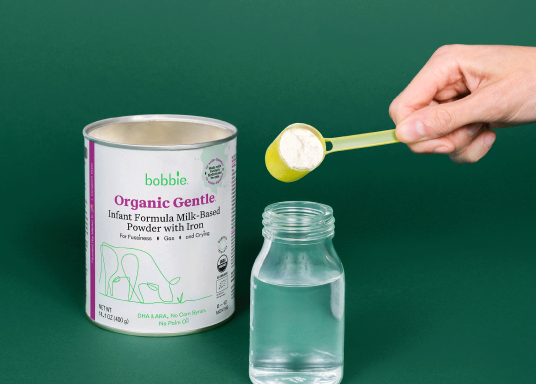Published August 15, 2023

What is DHA (and Why is it Important for Babies)?
Put on your glasses and grab a pencil for a nerdy lesson on fatty acids and brain development! We’re digging into docosahexaenoic acid, commonly known as DHA, to discuss what is DHA, DHA benefits, DHA in baby formula, and why it is so important for growing minds. If you’ve ever heard about fish oil supplements or omega-3 fatty acids found in fish, you may be more familiar with DHA than you think. Let’s dive in!
What is DHA?
DHA, or docosahexaenoic acid, is an omega-3 polyunsaturated fatty acid. Omega-3 fatty acids are commonly referred to as “good fats,” and include alpha-linolenic acid, or ALA, and eicosapentaenoic acid, or EPA, along with DHA. These fats are typically found in marine sources such as fish and algae and from certain nuts or seeds. While our bodies can produce some DHA from other fat sources, humans are not very efficient at this and need external sources of DHA from diet or from a dedicated DHA supplement to meet recommended levels.
Benefits of DHA
There are many benefits of DHA in babies, children, and adults. These good fats have been clinically proven to support a variety of bodily functions, particularly related to brain and eye health.
A crucial benefit of DHA is for pregnant women, as appropriate DHA supplementation (600-800mg of DHA per day) has been shown to reduce the risk of premature birth by up to 60%! Pregnant women can supplement their diet with two, four ounce servings of oily fish (that are pregnancy safe!) each week in order to source the appropriate amount of DHA or can supplement with a prenatal vitamin that includes DHA in its nutrient profile.
Why is DHA Important for Babies?
While DHA is important for mom and baby during pregnancy, it’s equally important once a baby is earth-side! Humans grow faster during the first 12 months of life than at any other point in their development. In fact, a baby’s brain doubles in size during just their first year! It takes a lot of calories and fat to support this brain growth, and DHA is an important contributing factor.
DHA helps support cognitive development, nervous system health, as well as increased visual acuity in full-term infants. To get science-y, courtesy of the journal Nutrients, DHA affects “neurotransmitter pathways, synaptic transmission, and signal transduction. Studies in animals and humans show that adequate levels of DHA in neural membranes are important for cortical astrocyte maturation and vascular coupling, and for cortical glucose uptake and metabolism.”
DHA status during pregnancy and infancy can influence outcomes later in life, including school performance in reading and spelling. Unfortunately, deficiencies in DHA may be linked to poorer cognitive performance, reduced visual acuity, and memory problems in both children and adults. Given the crucial developmental period between birth and age two, sufficient DHA intake is important– particularly for families who rely on infant formula to feed their babies.
DHA in Infant Formula
Like many other fatty acids, including palmitic acid and linoleic acid, DHA is naturally-occuring in human milk, the amounts depend on how much DHA mom eats. While both exclusively-breastfed and combo-fed infants can receive DHA from breast milk, formula-fed infants may be consuming a product that contains no DHA at all! This is because the United States’ F.D.A. does not require infant formula manufacturers to include DHA in their recipes. This stands in stark contrast to E.U. regulations which require infant formulas to contain between 20-50mg of DHA per serving.
While the U.S. does not require DHA to be included in infant formulas, many U.S. manufacturers do choose to include DHA at varying levels– some with as little as 7 mg of DHA per serving, while Bobbie meets the E.U. standard at 20mg of DHA per serving. Most U.S. formulas source DHA from marine algae, typically from either Schizochytrium sp. oil or Crypthecodinium cohnii oil. Many European formulas include DHA from fish oil, and one brand, Baby’s Only, sources DHA from egg. Families who have kiddos with allergies should pay special attention to the DHA source in their baby’s formula as both fish and egg are top-9 allergens!
Bobbie infant formulas are clean, EU-style infant formulas that meets all FDA requirements. They are complete nutrition, milk-based powder, modeled after breast milk and is easy on tummies. They are all non-GMO and do not have corn syrup, palm oil, or maltodextrin. Shop Bobbie today!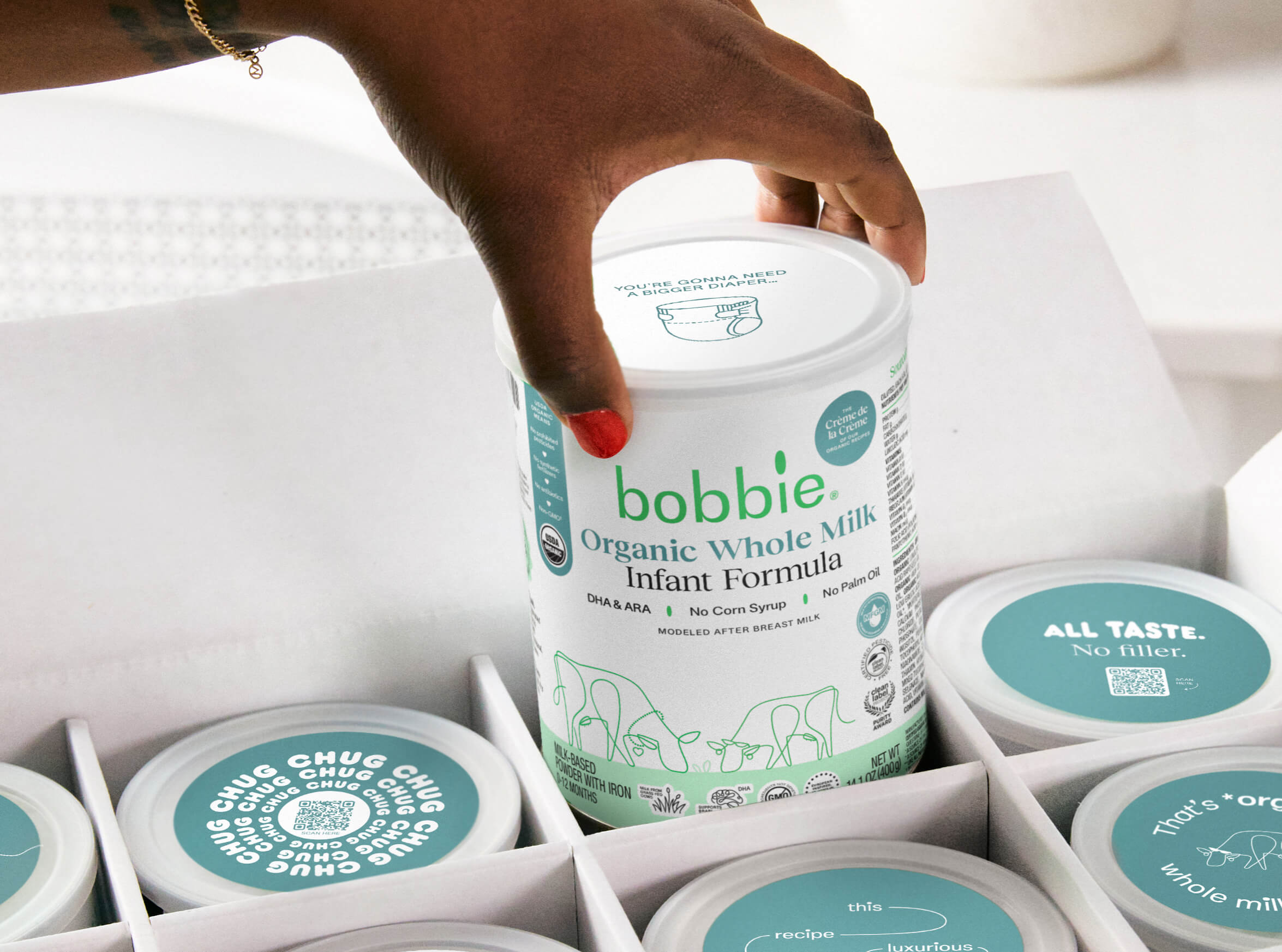
Shop Bobbie Baby Formula

The Bobbie Difference
Looking for an infant formula that includes DHA? Bobbie is the only U.S.-based formula brand to meet European standards for DHA, including 20mg of water-extracted algal DHA per 100kcal, 5 ounce serving.
Why does this matter? Leading experts recommend that infants under 24 months receive a minimum of 100mg of DHA per day to support healthy brain growth. The AAP recommends infants take in 24-32 ounces of formula or breastmilk each day, and as such, formulas must include at least 20mg DHA per serving to hit the 100mg daily DHA benchmark for all babies, no matter how much (or how little!) an exclusively formula-fed infant eats.
Any formula that includes less than 20mg DHA per 5oz serving (aka every other U.S.-based formula!) does not provide enough DHA to meet the daily recommended benchmark unless infants consume 30, 40, even 50 fluid ounces of formula each day– which is at the top end, and in some cases significantly over, the AAP’s daily volume recommendations.
Bobbie Organic and Bobbie Organic Gentle infant formulas provide DHA at the expert recommended level so that every baby receives this crucial fatty acid in sufficient amounts, even if they’re a variable eater day-to-day.
With these levels of DHA, an organic plant-based fat blend full of essential omega fatty acids, and choline, Bobbie is proud to help build the brains of infants nationwide*.

Incorporating DHA into Your Baby’s Diet
Your baby can receive DHA from a variety of sources, including from infant formula, breastmilk, solid foods, or from a supplement. To avoid deficiency, experts recommend infants consume at least 100 mg of DHA per day during their first two years of life, though this number can come in substantially higher depending on the expert. Adding DHA-rich foods or a DHA supplement to your baby’s diet is the best way to maximize benefit and reduce the risk of deficiency.
Sign up to get the scoop on feeding, sleep, poop, and so much more. By singing up for email, you are to receive marketing emails from Bobbie and can manage your email preferences or unsubscribe at anytime

Your go-to resource for all things new baby.
DHA from Food Sources
In addition to some baby formulas which are enriched with DHA, many foods naturally contain high levels of DHA and can be introduced when your baby starts solids, typically between 4-6 months of age. DHA-rich foods include:
- Salmon
- Shrimp
- Tuna
- Walnuts (be sure to mince or ground walnuts to reduce choking risk– never give whole nuts to a baby or toddler!)
- Eggs
- Quinoa
- Flaxseeds and flaxseed oil
- Chia seeds
DHA Supplements for Infants and Toddlers
If you have a picky eater or simply want to ensure that your baby or toddler is receiving enough DHA each day, an omega-3 supplement that contains DHA might make sense for your family. Many companies make DHA supplements for infants, including some infant formula companies, some adult vitamin companies, and some companies that specialize in marine-based DHA supplements. Typically packaged in liquid form, these DHA supplements can be added to a bottle of formula, mixed with solids, or given separately on a spoon if indicated by the product’s directions. Be aware, however, that many DHA supplements come with a fishy aftertaste and that this can be off-putting to little ones. Be sure to read consumer reviews to find a product that provides the DHA you want and has been given a taste-test stamp of approval!
Wrapping Up with DHA
Docosahexaenoic acid is a powerhouse fatty acid that’s clinically-shown to support brain development and eye health in infants. Need we say more? If increasing your baby’s DHA intake is a priority, turning to DHA-rich foods or using a DHA supplement are both great ways to boost their levels! This crucial acid is too important to miss out on, especially during your child’s early years when brain growth is at its peak. Here’s to eating more fish!
Bobbie infant formulas are clean, EU-style infant formulas that meets all FDA requirements. They are complete nutrition, milk-based powder, modeled after breast milk and is easy on tummies. They are all non-GMO and do not have corn syrup, palm oil, or maltodextrin. Shop Bobbie today!
Shop Bobbie Baby Formula

The content on this site is for informational purposes only and not intended to be a substitute for professional medical advice, diagnosis or treatment. Discuss any health or feeding concerns with your infant’s pediatrician. Never disregard professional medical advice or delay it based on the content on this page.














